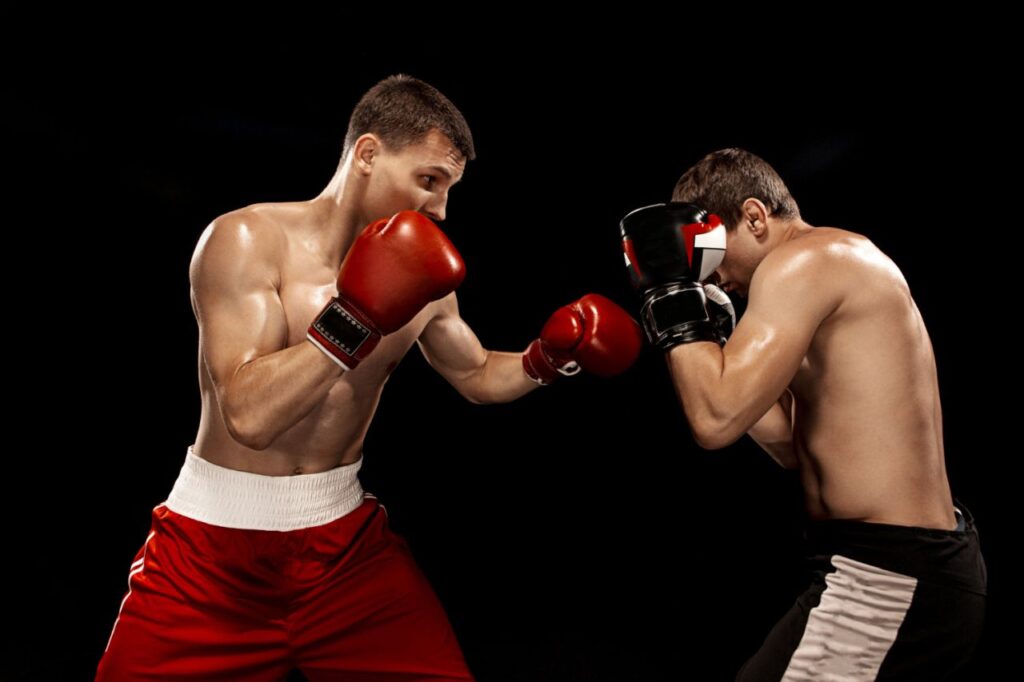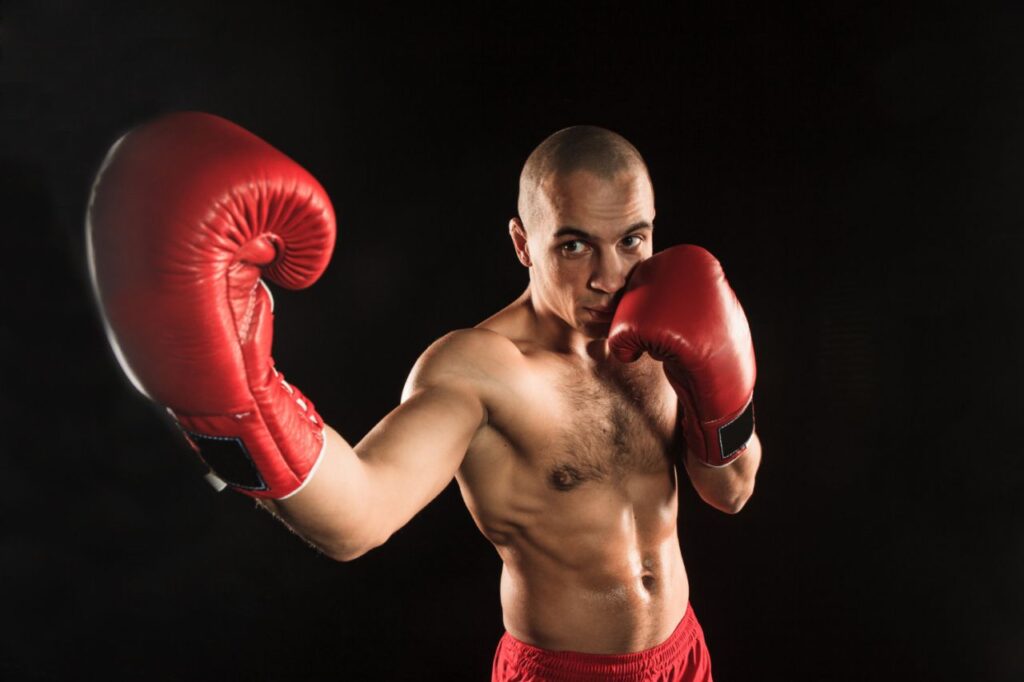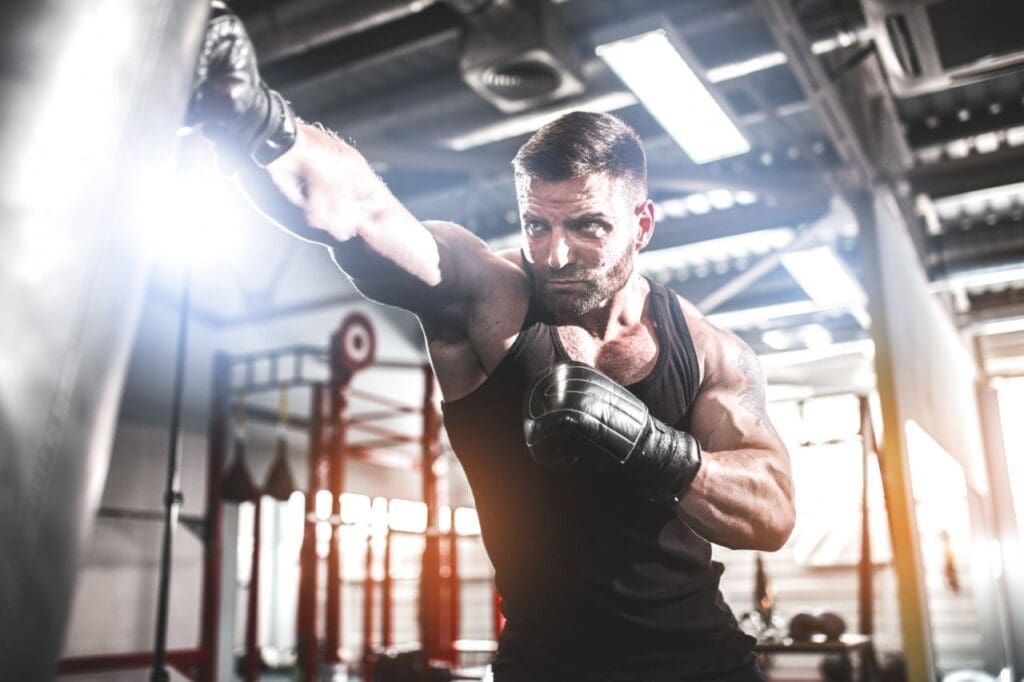Boxing is a high impact aerobic exercise that offers some serious benefits. Not only will it improve your strength, speed and stamina, but it provides a significant calorie burn, with a full-body session burning up to 1000 calories in an hour!
Boxing is a relatively easy and inexpensive sport to begin. Therefore, you don't need much fancy equipment, at least when you're just starting.
However, to ensure you're protected and training at your best, there are a few pieces of basic boxing equipment you will need before becoming a regular in the ring.
Boxing might be one of the world's oldest sports, having been an Olympic sport since 688 B.C, but it's essentially the same today as it was back then. Apart from the equipment used, that is.
Instead of fighting with bare fists, boxers now wear gloves and very often a head guard. The training regimes and nutrition plans of top boxers have evolved significantly too. But still, the action taking place within the ring is as raw and compelling as it has ever been.
What are the qualities of someone who can excel in boxing?
Most likely, someone who is willing to much time, energy, talent, and patience into becoming one - that means being willing to train long hours over many months, even years, to become an excellent boxer.
But that is not all that is required to excel in boxing - you also need to have the right boxing equipment to train. It would be pretty hard to train without some necessary boxing equipment.
Find A Space For Your Boxing Training
Before we get to punching bags and hand protection (hand wraps and gloves), you first need to assess the space where some home boxing equipment will fit best and where you can move around doing your boxing workouts.
Using a mat or not slippery mat helps when learning the basic footwork patterns and steps. There are many available online to purchase. Carpets and wood floors are sometimes not the best surfaces for training, and adding this piece of beginner boxing equipment can help you level up your boxing training.
What To Look For In Quality Boxing Equipment For Beginners
Safety Equipment
Boxing gloves are one of the most important pieces of safety equipment for beginner and expert boxers alike. However, if you plan to get into sparring sessions, you'll want to look for additional safety equipment.
Boxing headgear, a mouthguard and groin and chest protectors are all valuable pieces of safety equipment if you plan to get into sparring. Repeated punches to the head and face can cause severe injury.
Chest punches and other body punches can be debilitating if you're not prepared. Make sure you're ready for any sparring session with the proper safety equipment.
Proper Fit And Sizing
When gathering boxing equipment for beginners, you'll want to ensure everything fits correctly and is the right size. A pair of boxing gloves that's too heavy will limit your abilities, while a bag that's too light will swing around too much to be useful.
Consider your options, boxing goals, and budget before diving into boxing equipment for beginners. If you purchase something you intend to use regularly, make sure it fits well and is the best size for your needs, even if that means paying a little more.
Durability
It's normal for beginner boxers to want to save money as they invest in their new fitness regime. That being said, you want to be sure you don't skip corners or go with the cheapest options just because they'll save some money in the short run.
For example, a pair of cheap gloves may save you some money on the front end, but they won't hold up well to a heavy bag or regular practice.
You'll end up spending more money in the long run by continually replacing your cheap gloves than if you had purchased a durable pair from the beginning. Always go with something that can hold up against the wear and tear of regular impact.
Boxing Equipment For Beginners
Boxing Gloves
Boxing gloves for beginners is quite a debated subject, and there have been many resources written on the topic. To keep it brief here, there are two kinds of boxing gloves for beginners: bag gloves (or training gloves) and competition or sparring gloves.
You'll want to invest in a good pair of bag gloves. These are made to protect your hands while you beat a heavy bag, so it's best not to be cheap here, or you'll end up buying a new pair after only a few weeks.
The Bytomic Performer 3.0 Carbon Boxing Gloves are a great cost-sensitive option. They're extremely lightweight and comfortable, which makes them great for beginners.
Hand Wraps
Hand wraps are important if you want to protect all of the tiny bones in your hands as well as your wrists (you do). When wrapped correctly, hand wraps protect your knuckles as well as prevent your wrists from spraining or breaking while you throw heavy punches.
They're also great for extending the life of your boxing gloves. This is because wraps collect the sweat and blood that would otherwise drip into your gloves.
Hand wraps come in many sizes and styles. Longer styles allow you the option of wrapping your hands in several different ways, including the between the fingers method and basic method.
What Are The Different Boxing Hand Wraps Called?
Tape and Gauze:
- Pros - These are the lightest weight wraps with the most protection and a variety of sizes
- Cons - Not reusable and takes time to wrap, cannot be wrapped well by yourself.
Traditional hand wraps:
- Pros - Cost-efficient, reusable and easy to learn how to wrap yourself
- Cons - Can become loose, add to your laundry, and set sizes.
Elasticated 'Mexican' style hand wraps:
- Pros - stretches to conform to the hand, does not loosen, breathable.
- Cons - These are generally thicker and add to your laundry!
FightCamp Quick Wraps:
- Pros - No wrapping of the hand is necessary. They are put on similar to a glove and built to hold FightCamp punch trackers.
- Cons - If you prefer traditional hand-wraps, these will feel different since the cloth is not wrapped through the fingers
Boxing Heavy Bag

A heavy bag is only required to practice your boxing routine at home. If you only plan on training in the gym, there's certainly no reason to invest in a heavy bag. However, there's nothing quite as cathartic as throwing around a few punches when you get home...
There are many options for heavy bags, but the gist is that they weigh about 70 pounds, are filled with hard or soft fill, and are made of vinyl, leather, or canvas.
In addition, they come with a mount to attach to your ceiling or a stand.
A heavier bag is always a better choice than a light one, as the extra weight will keep the bag from swinging too much when you throw a powerful punch.
Century makes one of the best heavy bags for beginners and pros alike.
The Hydro core Handing Bag is made of high-quality vinyl, so it will withstand years of abuse without tearing or cracking. It is also filled with water rather than foam to control the firmness.
Boxing Headgear
Quality boxing headgear is essential if you plan on doing live sparring. It will take a lot of hits, so you must choose something that will last. Headgear protects you from cuts and scrapes; it will not prevent repeated punches to the head.
You can still blackout, get a concussion or any other heat-related injury with headgear on. It will alleviate some blow, but not enough to prevent injury resulting from repeat hits.
Double End Bag
The double end bag (or floor to ceiling bag) is a small bag on a cord between two points. Usually, these will connect to the floor and ceiling. The tension of the ropes can change how quickly the bag swings.
Likewise, the size of the ball can determine how big or small a target it is for training accuracy.
The double end bag allows for some good speed and rhythm training, with the added benefit of moving around and using good strikes. The bag swings back with speed means that this bag is also useful for practising blocking, which means you can easily practice counter striking.
Cobra Bag
Reflex bags (also referred to as Cobra bags) are similar to freestanding bags. The difference is that they have a smaller target and a spring, meaning the bag bounces back to you when hit.
These bags are easy to find and small enough to be put away when not in use easily. They make a good way to try out some light boxing combinations and work on timing. But, unfortunately, you often can't put too much power in on them.
Skipping Rope
A skipping rope is one of the most effective tools for a boxer, improving balance, coordination, rhythm and stamina. You'll also learn to be lighter on your feet and keep your weight on the balls of your feet, which helps you to move faster and throw more impactful punches.
Towel
Boxing is a sweaty business, so you'll want to keep a clean towel in your bag at all times. Both you (and possibly your gym mates) will be glad you brought a towel along to wipe it all away. And of course, you will also need one to dry off after your post-workout shower.
Mouthpiece
An exact fitting mouthpiece protects your teeth from serious damage in a boxing ring. You will need a mouthpiece even though you don't think you're at the risk of getting a hit in the face. You can protect your whole mouth from impact with these innovative mouthpieces.
Groin Protectors
While fighting and sparring, a groin protector will protect you from low blows. You can have different cups or female groin protectors in different shapes and designs.
This is essential boxing equipment, so don't leave it off later.
Focus Mitts
Get yourself a target to hit to simulate a match-like situation with the help of focus mitts. You can dodge sweeping motions of mitts to practice for punches coming your way.
Be mindful that if your trainer has one, you might not need it. If you plan to train at home with a partner, you should buy a pair of good focus mitts.
What Boxing Equipment Is Optional?
For more experienced boxers and those keen to delve further into their training, some additional pieces of equipment will maximise your training. These include:
FOCUS PADS
If you plan to train in pairs, focus pads are a great addition to your boxing workout. Pads will help you improve accuracy, timing, and speed and make for an even better cardiovascular workout.
SPEED BAG
A speed bag is another great way to develop your speed and reflexes. But, again, make sure you look for a high-quality bag that's durable, properly shaped, and balanced for accurate rebounds.
HEADGEAR
If you're taking your boxing training a step further into sparring, you must wear headgear. This will protect you from scrapes and scratches, as well as alleviate some of the blow if you're hit on the head.
But, of course, it's worth remembering that concussions and head injuries can still occur when you wear headgear, especially if you're receiving repeated hits.
MOUTH GUARD
A mouthguard is also essential for sparring, protecting your teeth from being knocked out, your gums from being bruised, and your lips from being split. Choose a high-quality mouth guard that fits more comfortably and will last longer.
Sports Involves Guide To Cleaning Your Boxing Gear
Boxing Glove Cleaning
Boxers are usually fixated on their boxing gloves. A lot of time goes into choosing just the right pair, and of course, that makes a lot of sense as gloves are not cheap and will be your steadfast partner throughout all of your training sessions.
It isn't hard to get the most out of your investment and keep them going as long as possible by caring for them, cleaning them properly, and keeping them in peak shape.
It is essential to wipe down the gloves after each workout.
Spraying and cleaning the inside and outside of your gloves with the antiseptic spray will do the trick and keep your gloves in good shape and completely hygienic.
Hand-Wrap Cleaning
Wearing a clean pair of hand-wraps underneath your boxing gloves will protect your hands and wrists while absorbing sweat. However, when trying to get the most out of your hand-wraps, you cannot ever let them sit and stew in your gym bag unwashed after you leave the gym.
Unpleasant odours are just the start of the issues that will occur. And no one wants to start their workout with wraps that are still sweaty and damp from the last training session.
Headgear And Groin Protector Cleaning

For obvious reasons, both of these items are extremely important. It would help if you never neglected them. You should wipe your headgear and groin protector with antiseptic wipes and hang up to air out after each training session.
Boxing Shoes
You know you've put some work in when you feel pools of sweat collecting in your shoes. That's a good thing. What's not good is failing to air them out afterwards. So, don't do that. Another "don't do" is to wear your shoes outside.
Boxing shoes are exactly that—boxing shoes. Wearing them outside or anywhere but in the gym or the ring will mean you'll have to invest in another pair far sooner than you'd like.
Jump Rope
Jumping rope is likely part of your routine in some form or fashion. First, avoid tangling by taking the jump rope out of your bag as soon as you get home. Next, hang the rope on a hook or hanger.
Then tie a paperweight to each handle. That should help prevent annoying tangling.
FAQs
Do You Wear Socks With Boxing Shoes?
Your boxing shoes should also be snug and fit like socks. The soles should be rubber to prevent you from slipping on a mat or your floor. And to best support your ankles while you "dance" around the ring, they should lace up past your ankles.
Can You Box Barefoot?
Amateur and professional boxers are obliged to wear specialised boxing shoes and cannot fight barefoot. Like most combat sportspeople, boxers fought with bare feet, but with the development and modernisation of the sport, the fighting became more organised and more civilised.
Can I Use Lysol Wipes For Boxing Gloves?
A simple spritz of Lysol, Febreze or another high strength anti-bacterial spray before and after sparring is enough to keep most bacteria at bay.
How Do You Get Rid Of The Smell In Boxing Gloves?
You are making the Gloves Smell Nice. Neutralise bad odours with baking soda. Baking soda is a universal deodoriser, and it can be used inside your boxing gloves to eliminate odours and neutralise bad smells. When your gloves are dry, sprinkle a few pinches of baking soda inside each glove and let it sit for a couple of hours.
How Do You Dry Boxing Gloves?
Air Drying - This is the safest way for your boxing gloves to dry. This is the most natural way and isn't hard on the material. The only con to this is the amount of time you're going to have to wait for them to dry. Make sure if your air dries your gloves that you don't need to be using them for many hours because nothing is worse than having to box with wet gloves.
Stuff Them With Newspapers - This is a way that isn't used very often. Not many people know about this, but it greatly speeds up the process of drying your boxing gloves. You can still use the air-drying method with this, and it also speeds it up because a lot of the wetness on the inside of the boxing gloves gets soaked into the newspapers.
Use a Blow Dryer - A blow dryer to dry off your boxing gloves is just short of what put them in the dryer would do. This is why you shouldn't let your boxing gloves get too hot when you do this. Take breaks as much as possible because the heat could ruin the inside of the boxing glove.
- Find a gym. Boxing gyms aren't typically found in the yellow pages, but there are resources on the internet that can lead you in the right direction. ...
- Be sure the gym is within striking distance. ...
- Be open-minded. ...
- Choose your coach carefully. ...
- Do judge the gym by its cover.
So, can boxing be self-taught? Boxing can be self-taught but it's not the quickest and most effective way to become better at the sport because you aren't able to tap into the knowledge of a boxing coach who would be able to help you one to one.
Best Age to Start
Specialists in sports medicine believe that boxing classes are better to start from 9-10 years. Starting too early could result in putting the student off, as boxing is hard work and not always as fun as team sports, such as football or rugby.

